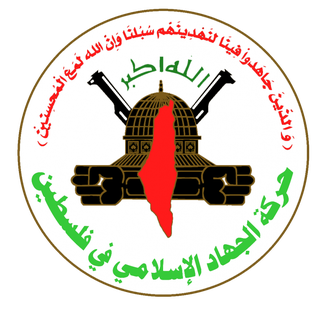
Islamism is a concept whose meaning has been debated in both public and academic contexts. The term can refer to diverse forms of social and political activism advocating that public and political life should be guided by Islamic principles or more specifically to movements which call for full implementation of sharia. It is commonly used interchangeably with the terms political Islam or Islamic fundamentalism. In academic usage, the term Islamism does not specify what vision of "Islamic order" or sharia are being advocated, or how their advocates intend to bring them about. In Western mass media it tends to refer to groups whose aim is to establish a sharia-based Islamic state, often with implication of violent tactics and human rights violations, and has acquired connotations of political extremism. In the Muslim world, the term has positive connotations among its proponents.
Qutbism is an Islamist ideology developed by Sayyid Qutb, the figurehead of the Muslim Brotherhood. It has been described as advancing the extremist jihadist ideology of propagating "offensive jihad" – waging jihad in conquest – or "armed jihad in the advance of Islam"

The Tijāniyyah is a sufi tariqa within Sunni Islam, originating in North Africa but now more widespread in West Africa, particularly in Senegal, The Gambia, Mauritania, Mali, Guinea, Niger, Chad, Ghana, Northern and South-western Nigeria and some part of Sudan. The Tijāniyyah order is also present in the state of Kerala in India. Its adherents are called Tijānī. Tijānī place great importance on culture and education, and emphasize the individual adhesion of the disciple (murīd). To become a member of the order, one must receive the Tijānī wird, or a sequence of holy phrases to be repeated twice daily, from a muqaddam, or representative of the order.

Islamic terrorism, Islamist terrorism or radical Islamic terrorism is defined as any terrorist act, set of acts or campaign committed by groups or individuals who profess Islamic or Islamist motivations or goals. Islamic terrorists justify their violent tactics through the interpretation of Quran and Hadith according to their own goals and intentions. The motivation for Islamic terrorism in part comes from the idea of Islamic supremacy which is encapsulated in the formula, "Islam is exalted and nothing is exalted above it."

Laskar Jihad, was an Islamist and anti-Christian Indonesian militia, which was founded and led by Jafar Umar Thalib. At present, the militia is believed to have disbanded.

Abdullah Yusuf Azzam also known as Father of Global Jihad was a Palestinian Sunni Islamic scholar and theologian and founding member of al-Qaeda. Azzam preached both defensive and offensive jihad by Muslims to help the Afghan mujahideen against the Soviet invaders. He raised funds, recruited and organised the international Islamic volunteer effort of Afghan Arabs through the 1980s, and emphasised the political aspects of Islam.

Fathi Shaqaqi was the co-founder and Secretary-General of the Islamic Jihad Movement in Palestine.
Osama bin Laden authored two fatāwā in the late 1990s. The first was published in August 1996 and the second in February 1998. At the time, bin Laden was not a wanted man in any country except his native Saudi Arabia, and was not yet known as the leader of the international terrorist organization al-Qaeda. Therefore, these fatāwā received relatively little attention until after the August 1998 United States embassy bombings, for which bin Laden was indicted. The indictment mentions the first fatwā, and claims that Khalid al-Fawwaz, of bin Laden's Advice and Reformation Committee in London, participated in its communication to the press.

Islamic extremism has been defined by the British government as any form of Islam that opposes "democracy, the rule of law, individual liberty and mutual respect and tolerance of different faiths and beliefs". Related terms include "Islamist extremism" and Islamism.

The Islamic Jihad Movement in Palestine known in the West as simply Palestinian Islamic Jihad (PIJ), is a Palestinian Islamist terrorist organization formed in 1981 whose objective is the destruction of the State of Israel and the establishment of a sovereign, Islamic Palestinian state. PIJ has been labelled a terrorist organisation by the United States, the European Union, the United Kingdom, Japan, Canada, Australia, New Zealand and Israel. Iran is a major financial supporter of the PIJ. Following the Israeli and Egyptian squeeze on Hamas in early 2014, PIJ has seen its power steadily increase with the backing of funds from Iran. Its financial backing is believed to also come from Syria. The Islamic Jihad Movement has sent "its gratitude to the brothers in Hezbollah, the Islamic resistance in South Lebanon. Particularly Hassan Nasrallah, for their stance and support, be it financial, military or moral support".
Ahmad Ibrahim al-Sayyid al-Naggar was a member of the Egyptian Islamic Jihad, an Islamist terrorist group active since the 1970s. The Jewish lobby group ADL dubbed him the "propaganda chief" of the militant organisation. He was one of 14 people subjected to extraordinary rendition by the CIA prior to the 2001 declaration of a War on Terror.
The Hamas Covenant or Hamas Charter, formally known in English as the Covenant of the Islamic Resistance Movement, was originally issued on 18 August 1988 and outlines the founding identity, stand, and aims of Hamas. A new charter was issued by Hamas leader Khaled Mashal on 1 May 2017 in Doha.
From the time of the Muhammad, the final prophet of Islam, many Muslim states and empires have been involved in warfare. The concept of jihad, the religious duty to struggle, has long been associated with struggles for promoting a religion, although many observers refer to such struggle as "the lesser jihad" by comparison with inner spiritual striving. Islamic jurisprudence on war differentiates between illegitimate and legitimate warfare and prescribes proper and improper conduct by combatants. Numerous armed anticolonial military campaigns were waged as jihads.
Counter-jihad or counterjihad or counter-jihad movement is a self-titled political current loosely consisting of authors, bloggers, think tanks, street movements and campaign organisations all linked by a common belief that the Western world is being subjected to takeover by Muslims. Several academic accounts have presented conspiracy theory as a key component of the counter-jihad movement. On a day-to-day level, it seeks to generate outrage at perceived Muslim crimes.
A worldwide caliphate is the concept of a single Islamic one-world government, supported in particular by Abu Bakr al-Baghdadi, a leader of the Islamic fundamentalist militant group the Islamic State of Iraq and the Levant. On April 8, 2006, the Daily Times of Pakistan reported that at a rally held in Islamabad the militant organization Sipah-e-Sahaba Pakistan called for the formation of a worldwide caliphate, which was to begin in Pakistan. In 2014, Baghdadi claimed the successful creation of a worldwide caliphate.
The Egyptian Islamic Jihad, formerly called simply Islamic Jihad, originally referred to as al-Jihad, and then the Jihad Group, or the Jihad Organization, is an Egyptian Islamist terrorist group active since the late 1970s. It is under worldwide embargo by the United Nations as an affiliate of Al-Qaeda. It is also banned by several individual governments worldwide. The group is a Proscribed Organisation in the United Kingdom under the Terrorism Act 2000.
Petro-Islam usually refers to the extremist and fundamentalist interpretation of Sunni Islam—sometimes called "Wahhabism"—favored by the conservative oil-exporting Kingdom of Saudi Arabia. Its name derives from source of the funding—petroleum exports—that spread it through the Muslim world following the Yom Kippur War. The term is sometimes called "pejorative" or a "nickname".
According to Sandra Mackey the term was coined by Fouad Ajami. It has been used by French political scientist Gilles Kepel, Bangladeshi religious scholar Imtiyaz Ahmed, and Egyptian philosopher Fouad Zakariyya, among others.





